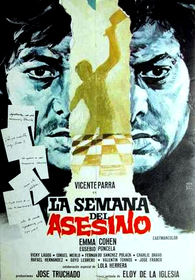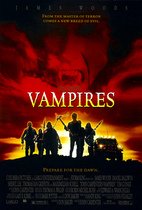Our editor-in-chief Nate Yapp is proud to have contributed to the new book Hidden Horror: A Celebration of 101 Underrated and Overlooked Fright Flicks, edited by Aaron Christensen. Another contributors include Anthony Timpone, B.J. Colangelo, Dave Alexander, Classic-Horror.com's own Robert C. Ring and John W. Bowen. Pick up a copy today from Amazon.com!
Cannibal Man (1972)
Cannibal Man, the infamous 1971 film by controversial Spanish director Eloy de la Igelsia, was never released theatrically in the U.S. It has been available as an import or a bootleg, and gained reputation not only for its brutal violence, but also for its provocative themes. With Anchor Bay's recent release of the film on DVD and video, the American audience at last has a chance to admire a lost minor classic of European exploitation.
Cannibal Man concerns a young slaughterhouse worker named Marcos, played to chilling precision by Vincente Parra. Titled La Semana del Asesino (The Week of the Killer) in Spanish, it follows him during a long, hot August week wherein his life spirals out of control. The accidental death of a cab driver leads Marcos into a series of murders from which he cannot escape. Whatever causes Marcos to snap, director de la Igelsia leaves ambiguous. It could be the brutality of his job (the film opens with a short, grotesque montage of the slaughter house where he works), or it could be social repression and despair. What is clear is that Marcos lacks both the emotional and the intellectual capacity to deal with his crimes. The title of the film, Cannibal Man, could suggest the novel way in which Marcos disposes of his victims. It could also refer to the way in which society 'eats up' its poor and underprivileged, in order to support the rich. Much is hinted of by de la Igelsia, in the corners of his sly screenplay.
But as much as he is interested in social commentary, the director also wants to make his viewer squirm. The scenes of violence are notoriously graphic, and, while not lingering, never let you escape the real horror of Marcos's actions. There are scenes of tension and grim humor that recall Alfred Hitchcock, and a hidden-in-plain-view twist that brings the whole film together. And then there's the gay character, Nestor.
At first only on the fringes of the story, the character of Nestor develops into central part of the tale. While he is played ambiguously asexual by Eusebio Poncela, Nestor is clearly meant to be a homosexual, imbuing both the decadence of the upper-class, as well as being an outsider with whom Marcos can find some understanding. The homoerotic tension builds between the two men, until the final confrontation, which is both tense and strangely muted.
Cannibal Man is clearly a unique film. It is both a violent study of madness, and a shrewd social satire. Eloy de la Igelsia would latter in his career become famed for his scathing, gay-themed, political films. Here, in one of his earlier films, one can see how he worked the same themes into a brutal, bloody exploitation film.








